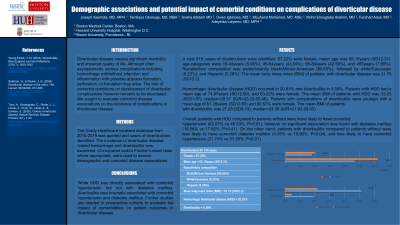Back


Poster Session E - Tuesday Afternoon
Category: Colon
E0097 - Demographic Associations and Potential Impact of Comorbid Conditions on Complications of Diverticular Disease
Tuesday, October 25, 2022
3:00 PM – 5:00 PM ET
Location: Crown Ballroom

Has Audio

Joseph Asemota, MD, MPH
Boston Medical Center
Boston, Massachusetts
Presenting Author(s)
Joseph Asemota, MD, MPH1, Temitayo Gboluaje, MD, MBA2, Sneha Adidam, MD2, Mouhand F. Mohamed, MD, MSc3, Owen Igbinosa, MD2, Mohd Elmugtaba Ibrahim, MD2, Farshad Aduli, MD2, Adeyinka Laiyemo, MD, MPH2
1Boston Medical Center, Boston, MA; 2Howard University Hospital, Washington, DC; 3Warren Alpert Medical School of Brown University, Providence, RI
Introduction: Diverticular disease causes significant morbidity and impaired quality of life. Although often asymptomatic, serious complications including hemorrhage with/without infarction and inflammation with possible abscess formation, perforation, or fistulation may arise. The role of comorbid conditions on development of diverticular complications however remains to be elucidated. We sought to evaluate comorbid disease associations on the incidence of complications in diverticular disease.
Methods: The Grady Healthcare inpatient database from 2010-2019 was queried and cases of diverticulosis identified. The incidence of diverticular disease related hemorrhage and diverticulitis was examined. Chi-squared and/or Fischer’s exact tests where appropriate, were used to assess demographic and comorbid disease associations.
Results: A total 418 cases of diverticulosis were identified, 67.22% were female, mean age was 65.15years (SD12.31), age-categories were 18-44years (5.98%), 45-64years (43.54%), 65-84years (42.58%), and ≥85years (7.89%). Racial/ethnic composition was predominantly black/African-American (85.65%), followed by white/Caucasian (6.22%), and Hispanic (5.26%). The mean body mass index (BMI) of patients with diverticular disease was 31.75 (SD12.2).
Hemorrhagic diverticular disease (HDD) occurred in 20.81% and diverticulitis in 5.50%. Patients with HDD had a mean age of 74.97years (SD12.90), and 63.22% were female. The mean BMI of patients with HDD was 33.03 (SD21.87), median=28.57 (IQR=25.22-35.46). Patients with complications of diverticulitis were younger with a mean age of 61.39years (SD12.60) and 69.57% were female. The mean BMI of patients with diverticulitis was 27.28 (SD9.19), median=24.36 (IQR=21.92-28.03).
Overall, patients with HDD compared to patients without were more likely to have comorbid hypertension (62.07% vs 46.53%, P=0.01), however no significant association was found with diabetes mellitus (19.54% vs 17.82%, P=0.41). On the other hand, patients with diverticulitis compared to patients without were less likely to have comorbid diabetes mellitus (4.35% vs 18.99%, P=0.04), and also less likely to have comorbid hypertension (21.74% vs 51.39%, P=0.01).
Discussion: HDD was directly associated with comorbid hypertension but not with diabetes mellitus, while diverticulitis was inversely associated with comorbid hypertension and diabetes mellitus. Further studies are needed in prospective cohorts to evaluate the impact of comorbidities on patient outcomes in diverticular disease.
Disclosures:
Joseph Asemota, MD, MPH1, Temitayo Gboluaje, MD, MBA2, Sneha Adidam, MD2, Mouhand F. Mohamed, MD, MSc3, Owen Igbinosa, MD2, Mohd Elmugtaba Ibrahim, MD2, Farshad Aduli, MD2, Adeyinka Laiyemo, MD, MPH2. E0097 - Demographic Associations and Potential Impact of Comorbid Conditions on Complications of Diverticular Disease, ACG 2022 Annual Scientific Meeting Abstracts. Charlotte, NC: American College of Gastroenterology.
1Boston Medical Center, Boston, MA; 2Howard University Hospital, Washington, DC; 3Warren Alpert Medical School of Brown University, Providence, RI
Introduction: Diverticular disease causes significant morbidity and impaired quality of life. Although often asymptomatic, serious complications including hemorrhage with/without infarction and inflammation with possible abscess formation, perforation, or fistulation may arise. The role of comorbid conditions on development of diverticular complications however remains to be elucidated. We sought to evaluate comorbid disease associations on the incidence of complications in diverticular disease.
Methods: The Grady Healthcare inpatient database from 2010-2019 was queried and cases of diverticulosis identified. The incidence of diverticular disease related hemorrhage and diverticulitis was examined. Chi-squared and/or Fischer’s exact tests where appropriate, were used to assess demographic and comorbid disease associations.
Results: A total 418 cases of diverticulosis were identified, 67.22% were female, mean age was 65.15years (SD12.31), age-categories were 18-44years (5.98%), 45-64years (43.54%), 65-84years (42.58%), and ≥85years (7.89%). Racial/ethnic composition was predominantly black/African-American (85.65%), followed by white/Caucasian (6.22%), and Hispanic (5.26%). The mean body mass index (BMI) of patients with diverticular disease was 31.75 (SD12.2).
Hemorrhagic diverticular disease (HDD) occurred in 20.81% and diverticulitis in 5.50%. Patients with HDD had a mean age of 74.97years (SD12.90), and 63.22% were female. The mean BMI of patients with HDD was 33.03 (SD21.87), median=28.57 (IQR=25.22-35.46). Patients with complications of diverticulitis were younger with a mean age of 61.39years (SD12.60) and 69.57% were female. The mean BMI of patients with diverticulitis was 27.28 (SD9.19), median=24.36 (IQR=21.92-28.03).
Overall, patients with HDD compared to patients without were more likely to have comorbid hypertension (62.07% vs 46.53%, P=0.01), however no significant association was found with diabetes mellitus (19.54% vs 17.82%, P=0.41). On the other hand, patients with diverticulitis compared to patients without were less likely to have comorbid diabetes mellitus (4.35% vs 18.99%, P=0.04), and also less likely to have comorbid hypertension (21.74% vs 51.39%, P=0.01).
Discussion: HDD was directly associated with comorbid hypertension but not with diabetes mellitus, while diverticulitis was inversely associated with comorbid hypertension and diabetes mellitus. Further studies are needed in prospective cohorts to evaluate the impact of comorbidities on patient outcomes in diverticular disease.
Disclosures:
Joseph Asemota indicated no relevant financial relationships.
Temitayo Gboluaje indicated no relevant financial relationships.
Sneha Adidam indicated no relevant financial relationships.
Mouhand Mohamed indicated no relevant financial relationships.
Owen Igbinosa indicated no relevant financial relationships.
Mohd Elmugtaba Ibrahim indicated no relevant financial relationships.
Farshad Aduli indicated no relevant financial relationships.
Adeyinka Laiyemo indicated no relevant financial relationships.
Joseph Asemota, MD, MPH1, Temitayo Gboluaje, MD, MBA2, Sneha Adidam, MD2, Mouhand F. Mohamed, MD, MSc3, Owen Igbinosa, MD2, Mohd Elmugtaba Ibrahim, MD2, Farshad Aduli, MD2, Adeyinka Laiyemo, MD, MPH2. E0097 - Demographic Associations and Potential Impact of Comorbid Conditions on Complications of Diverticular Disease, ACG 2022 Annual Scientific Meeting Abstracts. Charlotte, NC: American College of Gastroenterology.
